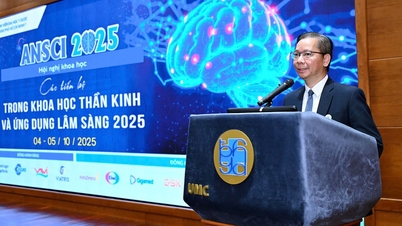
Dr. Ngo Thi Kim Oanh, University of Medicine and Pharmacy Hospital , Ho Chi Minh City, Campus 3, said that attention deficit hyperactivity disorder (ADHD) is a neurodevelopmental disorder characterized by a persistent pattern of inattention and/or hyperactivity-impulsivity that begins in childhood, persists over time, and causes significant impairment in learning, work, and social relationships in two or more contexts.
Core symptoms include difficulty maintaining concentration, easily distracted, poor organization, and forgetfulness, accompanied by restlessness, hyperactivity, talkativeness, and uncontrollable impulsiveness. Diagnosis is based on a comprehensive clinical evaluation to rule out other causes and determine the degree of functional impairment.
ADHD is not just a problem for boys. Many girls and adult women have ADHD, but it is often overlooked or diagnosed late. This is important because the pattern of symptoms in girls is often different from the familiar picture.
Instead of being hyperactive and impulsive, many girls are absent-minded, slow to complete tasks, and have difficulty maintaining concentration when doing boring tasks. Because they do not make much noise, these signs are easily considered personality traits or laziness.
Social expectations of women also contribute to masking the problem. Many women try to compensate by over-planning, working long hours, asking family members for reminders, and using note-taking and calendar apps. These efforts may provide temporary relief, but they also make others think everything is fine, delaying referrals to a specialist.
In women, ADHD is often accompanied by anxiety, depression, sleep disturbances, or eating disorders. When patients present for fatigue, insomnia, or sadness, they may be treated for these problems without a full assessment of their attention, emotional control, and organization. By focusing only on the comorbidities, the underlying ADHD may be overlooked.
Hormones are also an important piece of the puzzle. Many women report that their symptoms are worse at certain times of their menstrual cycle, after giving birth, or during perimenopause.
"Understanding these fluctuations helps patients observe themselves better and helps doctors choose appropriate intervention plans for each stage," said Dr. Kim Oanh.
Delayed diagnosis not only reduces academic and work performance but also erodes self-esteem. Many women are only diagnosed with ADHD in adulthood, after years of blaming themselves for not trying hard enough. In fact, ADHD is a neurodevelopmental disorder with a biological mechanism. Patients need to be properly evaluated and can improve significantly with proper treatment.
If you suspect you or your child has ADHD, start by writing down common situations such as forgetting appointments, leaving work unfinished, taking too long for simple tasks, or being overwhelmed by multitasking. Talk to teachers or colleagues for additional feedback on the school and work environment. Bring these notes to your doctor's appointment so he or she can get a more complete picture.
Diagnosis of ADHD should be made by a trained physician or team of experienced professionals. The process typically includes a clinical interview, a history from childhood, an assessment of the impact on school, work, and relationships, and screening for comorbid mental health problems. Supportive scales are only part of the assessment and do not replace professional judgment.
ADHD treatment is individualized. In addition to appropriate medications, nonpharmacological interventions such as training in organizational skills, time management, sleep habits, and physical activity can be helpful. For women with cyclical symptom fluctuations, your doctor may work with you to develop a monthly schedule for task management and symptom monitoring to better tailor interventions.
Dr. Kim Oanh emphasized that ADHD is not a fixed sentence. Early recognition, correct understanding and proper companionship will help girls and adult women develop their strengths. When the community understands that ADHD in girls has different manifestations than commonly imagined, we will be less likely to blame them for laziness or lack of effort and will know how to encourage them to seek timely professional support.
Families can contact the nearest medical facility with a mental health, neurological, or clinical psychology clinic for advice. If you have been treated for anxiety, depression, or sleep disorders but still have difficulty paying attention and organizing work, feel free to discuss the possibility of ADHD with your doctor for a more comprehensive assessment.
Source: https://nhandan.vn/tai-sao-kho-phat-hien-hoi-chung-roi-loan-tang-dong-giam-chu-yo-nu-post913450.html


![[Photo] Prime Minister Pham Minh Chinh chairs the 16th meeting of the National Steering Committee on combating illegal fishing.](https://vphoto.vietnam.vn/thumb/1200x675/vietnam/resource/IMAGE/2025/10/07/1759848378556_dsc-9253-jpg.webp)
























![[Photo] Super harvest moon shines brightly on Mid-Autumn Festival night around the world](https://vphoto.vietnam.vn/thumb/1200x675/vietnam/resource/IMAGE/2025/10/07/1759816565798_1759814567021-jpg.webp)




































































Comment (0)